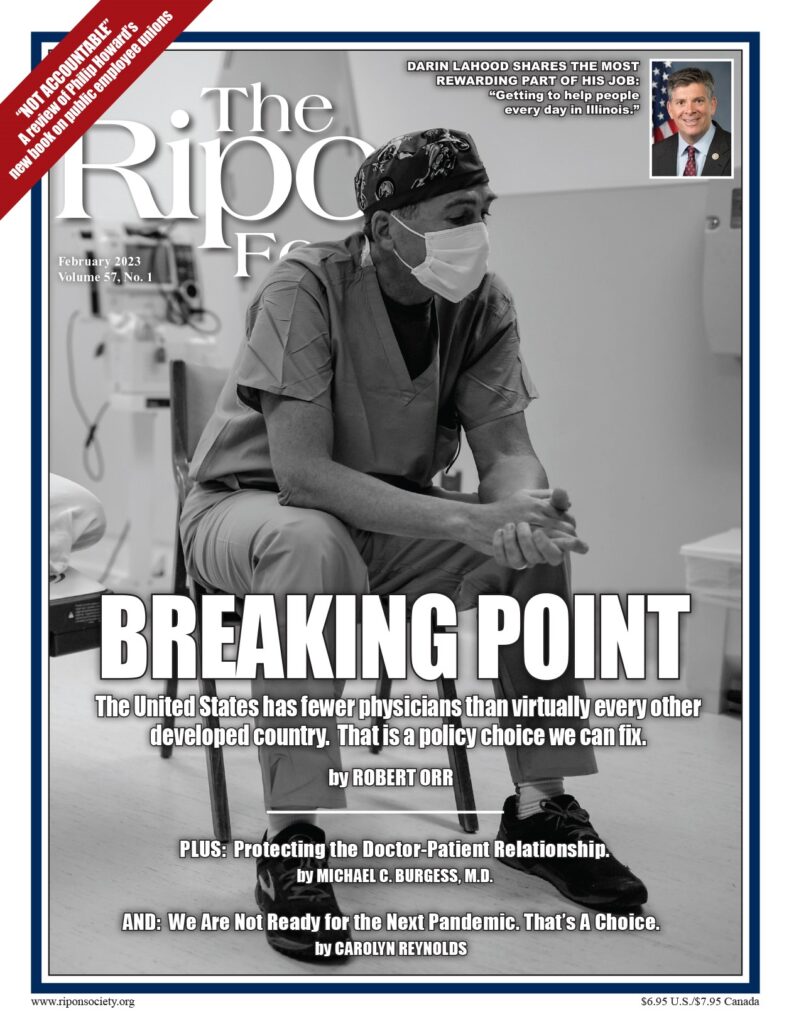Latest Ripon Forum Examines Nation’s Doctor Shortage and the State of Pandemic Preparedness in America

WASHINGTON, DC — With our nation approaching the third anniversary of the COVID-19 lockdown, the latest edition of The Ripon Forum examines the state of pandemic preparedness in America and the fact that our country has fewer doctors per capita than virtually every other developed country in the world.
Leading the Forum’s coverage is Robert Orr of the Niskanen Center, who, in an essay entitled “Breaking Point,” assesses the shortage of physicians in the U.S. and explains why it is a problem that can and should be fixed. “Doctors are increasingly reporting being overworked and burned out at the same time that Americans are increasingly reporting supply-related barriers to accessing care,” Orr writes. “Why do we have so few doctors? The vast bulk of the blame here lies with the substantial bottlenecks in our training and education pipeline.”
“The United States should pursue policies aimed at substantially boosting the number of physicians. Many highly capable young Americans would like to practice medicine. We simply have to let them. Achieving this would involve investing in the creation of additional medical schools, restructuring residency funding to better support the nation’s health needs, and experimenting with strategies to offer a streamlined medical degree pathway that’s more in line with the rest of the developed world.”
In another essay, U.S. Rep. Michael Burgess (TX-26) examines another challenge facing doctors today — administrative paperwork. “Prior authorization is a process in which a physician gets permission by an insurance company prior to performing a service,” writes Burgess, who spent nearly three decades practicing medicine prior to his election to Congress in 2003. “From personal experience, it is incredibly troubling to me that administrative responsibilities could block patient access to treatment. What is the value of developing a relationship with your patient if the insurance company or the government is going to tell you how to treat your patient?”
A shortage of health care professionals is not the only challenge facing America as it approaches the third anniversary of the COVID-19 lockdown. According to Carolyn Reynolds, Co-Founder of Pandemic Action Network, as the country attempts to move beyond the current pandemic, it is also remarkably unprepared for the next one. “Burned out health workers have left the profession in droves, leaving massive staffing shortages,” Reynolds writes. “Health systems everywhere have been stretched to the max, especially in the most vulnerable communities and countries. Disinformation, distrust of public health authorities, and vaccine hesitancy are at all-time highs, with fewer people willing to adhere to public health measures that can stop pandemics from spreading.”
“We must treat pandemic preparedness with the same sustained level of priority, planning, investment, and innovation as we do our military and economic defenses – to ensure we are always ready for the next threat. Outbreaks will continue to happen, but letting them turn into pandemics is a costly political choice. No one wants to go back to March 2020, so let’s make the smart choice to invest now in pandemic preparedness. That is something both sides of the aisle should agree on.”
In addition to examining America’s preparedness for the next pandemic, the latest edition of the Forum also features Deputy Editor Caroline Banaszak’s review of Not Accountable, a new book written by attorney and good government expert Philip Howard about the power of public employee unions and how it has helped fuel government dysfunction. Veteran House leadership aide Mike Johnson takes a look at the 118th Congress and finds reason to hope that leaders on both sides of the aisle will find common ground in the coming year.
John Pudner of Take Back Our Republic examines some of the election reforms being implemented in states across the country and explains why Republicans should pay particular attention to what’s taking place in Alaska and Nevada. In another op-ed, Forum Editor Lou Zickar looks back at the President’s past support of sunset legislation as a member of the Senate, and argue that, with Congress nearing a fiscal cliff, Republicans should see if he would support similar legislation again.
In the Forum’s debate feature, Berin Szóka of TechFreedom and Scott Cleland of the Restore Us Institute square off over the question of whether Section 230 of the 1996 Communications Decency Act should be repealed. And in our latest Ripon Profile, U.S. Rep. Darin LaHood (IL-16) discusses the toughest, and most rewarding, parts of his job.
The Ripon Forum is published six times a year by The Ripon Society, a public policy organization that was founded in 1962 and takes its name from the town where the Republican Party was born in 1854 – Ripon, Wisconsin. One of the main goals of The Ripon Society is to promote the ideas and principles that have made America great and contributed to the GOP’s success. These ideas include keeping our nation secure, keeping taxes low and having a federal government that is smaller, smarter and more accountable to the people.



